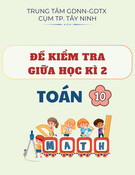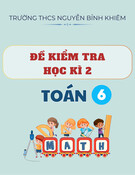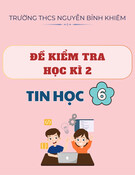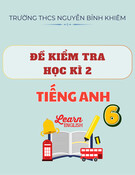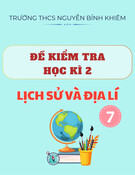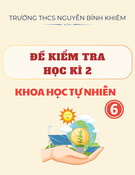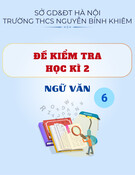
English Test _ No 2
Time allowed: 45 minutes
Full name: ................................
Class 12C...
Chọn từ/ cụm từ thích hợp (ứng với A hoặc B, C, D) để hoàn thành mỗi câu sau:
1. Each term is ………………..by one-break called half term.
A. divided B. cut C. marked D. separated
2. Ann couldn’t come to the party, ……….was a pity.
A. that B. what C. which D. where
3. The new library was built in the centre of the…………………..
A. city B. country C. campus D. village
4. Schooling is ………..for all English children from the age of 5 to 16.
A. compulsory B. force C. free D. useful
5. Jame has just graduated…………a University. Now he is looking for a job.
A. from B. to C. with D. under
6. Our children ……….to school by bus everymorning.
A. take B. are taken C. have taken D. are take
7. …………..she had agreed, you would have done it.
A. If B. Unless C. Should D. Would
8. The boy…………had been wounded by an arrow fell off his horse.
A. which B. whom C. who D. where
9. World Cup 2010 will ……………in South Africa.
A. be held B. be made C. be done D. held
10. Vietnam exports a lot of rice ……….. is grown in the South of the contry.
A. what B. which C. whom D. where
11. Lan: “Are you American?” – John: “__________”
A. Sorry! B. Yes? C. Excuse me? D. Pardon?
12. The kitchen …………….now by Mr Black.
A. was being painted B. are painting
C. is being painted D. is painted
13. It's important to give clear and honest answers
A. frank B. polite C. correct D. interesting
14. Several candidates were ………….a second interview.
A. asked B. left for C. called for D. requested for
15. The woman …………son is studying at that university is a teacher.
A. who B. whose C. whom D. which
16. The first year at college was probably the best and most………year of my life.
A. challenge B. challenged C. challenging D. challenged
17. If the doctor had arrived sooner, the boy……………….
A. might be saved B. have been saved
C. was saved D. might have been saved
18. If you …………to be chosen for the job, you will have to be experienced in the field.
A. want B. wanted C. had wanted D. wants
19. Children start ………………1 when they are 6 years old.
A. grade B. level C. step D. stage
20. English, math and literature are ………subjects.
A. parts B. centre C. core D. middle
Đọc kỹ đoạn văn sau và chọn phương án đúng (ứng với A hoặc B, C, D):
JOB INTERVIEW - SELLING YOURSELF
Mark & Remark
M· ®Ò thi 257

When you apply for a job, one of the most important things is job interview. In order to make a
good impression during a job interview, you need to prepare yourself for the interview carefully.
Punctuation is very necessary. You should arrive in plenty of time so that you have a little of
time to relax and keep calm before the interview.
You should be well dressed. Do not wear a skirt which is too short or jeans. You also need to
plan what you are going to say. You have to answer a lot of questions about your education and
experience. You may be asked many things about yourself, and especially about the reason why you
decide to apply for the job.
You can ask the interviewer about the salary you expect, the position you are applying and the
duties you have to do in the job.
You also must try to find out as much as possible about the Company you want to work for.
21. When you apply for a job …………………….
A. job interview is not important. B. don't make any good impression.
C. preparation is not necessary. D. interview is important for you to prepare.
22. What about punctuation?
A. Being late is all right B. You should arrive early enough to relax
C. Punctuation is not important D. If you are late the interviewer will wait.
23. What about clothes?
A. You can wear whatever you like. B. You should be well dressed.
C. Jeans are suggested. D. A short skirt makes you more attractive.
24. You may be asked about ………………..
A. your study B. the reason why you are interested in the job
C. your experience D. All are correct
25. You can ask the interviewer about ……………
A. the salary, position and duties B. the salary, position and his age
C. the salary and the interviewer's education D. the salary, the interviewer's family and his
duties.
Chọn từ có phần gạch chân được phát âm khác với các từ còn lại trong mỗi câu sau.
26. A. chance B. challenge C. scholarship D. achievement
27. A. apply B. university C. vacancy D. identity
28.
A. course B. courtesy C. source D. force
29. A. employers B. forgets C. asks D. stops
30. A. final B. applicant C. high D. decide
Dùng từ gợi ý, viết lại các câu sau có nghĩa tương đ ương:
31. Students who arrive late will not be permitted to enter the classroom.
→ Students …………………………………………………………………
32. That girl is my best friend. She is standing overthere.
→ The girl …………………………………………………………………..
33. My mother has prepared the dinner.
→ The dinnner………………………………………………………………
34. If I had some money, I would lend you.
→ Unless I hadn’t …………………………………………………………..
35. I didn’t know your address, so I couldn’t visit you.
→ If I had………………………………………………..…………………..
Chọn từ có vị trí trọng âm khác với các từ còn lại.
36.A. computing B. chemistry C. cinema D. candidate
37. A. polite B. police C. listen D. between
28. A. economy B. engineering C. sociology D. geographical
29. A. knowledge B. enjoy C. decide D. pretend
40. A. confidence B. conference C. conductor D. context


1
Class 12…. ENGLISH TEST
Name: ………………………. Allotted Time: 45 minutes
Date: ……./ 10/ 2011
Mã đề: 121
Choose the word which has the underlined part pronounced differently from the rest.
1. A. hands B. parents C. chores D. boys
2. A. included B. wanted C. decided D. noticed
Choose the word which is stressed differently from the rest.
3. A. nervous B. polite C. verbal D. body
4. A. carpet B. visit C. summer D. include
Choose a, b, c, or d that best completes each unfinished sentence, substitutes the underlined part, or has a
close meaning to the original one.
5. Most doctors and nurses have to work on a _______ once or twice a week at the hospital.
A. solution B. night shift C. household chores D. special dishes
6. I didn't think his comments were very appropriate at the time.
A. correct B. right C. exact D. suitable
7. It is parents' duty and responsibility to _____hands to take care of their children and give them a happy home.
A. shake B. hold C. join D. take
8. You are old enough to take _______ for what you have done.
A. responsible B. responsibility C. responsibly D. irresponsible
9. Tuan: You look great in this new dress. Lan: ________.
A. With pleasure B. Not at all C. I am glad you like it D. Do not say that
10. The mother told her son _______ so impolitely.
A. not behave B. did not behave C. not behaving D. not to behave
11. It is generally believed that "Men build _______ house and women make it _______ home".
A. the / Ø B. a / an C. the / a D. a / the
12. The mother asked her son _______.
A. where he has been B. where had he been C. where has he been D. where he had been
13. It is not easy to ________ our beauty when we get older and older.
A. develop B. maintain C. gain D. collect
14. Many young people have objected to _____marriage, which is decided by the parents of the bride and groom.
A. agreed B. shared C. contractual D. sacrificed
15. Professor Berg was very interested in the diversity of cultures all over the world.
A. variety B. changes C. conservation D. number
16. Sometimes Mr. Pike has to work very late _______ night to do some important experiments.
A. in B. at C. for D. on
17. The boy waved his hands to his mother, who was standing at the school gate, to ______ her attention.
A. attract B. pull C. follow D. tempt
18. Ann: What an attractive hair style you have got, Mary! - Mary: _______
A. Thank you very much. I am afraid B. You are telling a lie
C. Thank you for your compliment D. I don't like your sayings
19. They _______ him for weeks.
A. do not see B. did not see C. have not seen D. will not have seen
20. Every day Mary _____ on the computer, but today she _____ a typewriter because there is no power.
A. types / is using B. is tying / uses C. has typed / will use D. types / has used
21. Where is Jimmy? - He is ____ work. He is busy ____ his monthly report.
A. on / for B. in / about C. to / through D. at / with
22. I _______ there once a long time ago and _______ back since then.
A. went / have not been B. go / am not C. have gone / was D. was going / had not been
23. Yesterday, I _______ for work late because I _______ to set my alarm.
A. left / forgot B. left / had forgot C. left / would forget D. leave / was forgetting
24. When you see your teacher approaching you, a slight wave to attract his attention is appropriate.
A. coming nearer to B. catching sight of C. pointing at D. looking up to

2
25. Our teacher often said, "Who knows the answer? _______ your hand."
A Rise B. Lift C. Raise D. Heighten
26. He advised _______ too far.
A. her did not go B. her do not go C. her not to go D. she did not go
27. I _______ a terrible accident while I _______ on the beach.
A. see / am walking B. saw / was walking C. was seeing / walked D. have seen / were walking
Identify the one underlined word or phrase that must be changed in order to make the sentence correct
28. Thank you very much of the present that you sent me.
A B C D
29. I didn’t see Mary since she went to live in the capital.
A B C D
30. Lan told to me that she would talk to you later.
A B C D
Read the following passage and mark the letter A, B, C, or D on your answer sheet to indicate the correct
answer to each of the questions from 36 to 40.
In the United States and Canada, it is very important to look at a person in the eyes when you are having a
conversation with him or her. If you look down or to the side when the other person is talking, that person will
think that you are not interested in what he or she is saying. This of course, is not polite. If you look down or
to the side when you are talking, you may appear hiding something, that is, it might seem that you are not
honest. However, people who are speaking will sometimes look away for a few seconds when they are
thinking or trying to find the right word. But they always turn immediately back to look the listener in the
eyes. These social rules are the same for two women, two men, a woman and a man, or an adult and a child.
31. These social rules are used for _____.
A. two men B. a man and a woman C. everybody D. two women
32. When you are talking to an American or Canadian, you should _____.
A. look directly at him or her B. look to the side
C. avoid looking directly at him or her D. look down
33. Looking down or to the side when you are spoken to means _____.
A. you respect him or her B. you are afraid of him or her
C. you are paying attention to him or her D. you feel bored with his or her words
34. It is very _____ of you not to look in the eyes of the listener while talking.
A. impolite B. polite C. honest D. dishonest
35. People can look away for a few words while speaking _____.
A. to find something B. to find the correct word C. to hide something D. to hide their feelings
Choose A, B, C, or D that best completes the passage below.
The United State has many different types of families. While most American families are traditional,(36) ____ a
father, mother and one or more children, 22 percent of all American families in 1980 were dead by one parent,
usually a woman. In a few families in the United States, there are no children. These (37)____ couples may
believe that they would not make good parents, they may want freedom the responsibilities of childrearing; or,
perhaps they (38) _____ physically able to have children. Other families in the United States have one adult
(39)____ a stepparent. A step mother or step father is a person who joins a family by marrying a father or mother.
Americans tolerate and accept these different types of families. In the United States, people have the right to
privacy and Americans do not believe in telling other Americans what types of family group they must belong to.
They respect each other's choices regarding family groups. Families are very important (40)____ Americans.
36. A. consisting of B. consisting C. consist of D. in concluding of
37. A. childlike B. childish C. childless D. childhood
38. A. weren't B. can't C. are not D. couldn't
39. A. who is B. is C. which has D. which is
40. A. to B. of C. for D. in
. . . . . . . . . . . . THE END . . . . . . . . . . . .

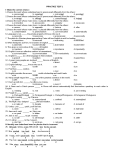
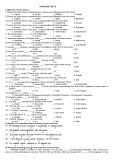
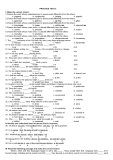
![Đề kiểm tra Tiếng Anh 12 trắc nghiệm: [Kinh nghiệm/Mới nhất/Chuẩn nhất]](https://cdn.tailieu.vn/images/document/thumbnail/2011/20111010/portsmouth2518/135x160/lesson_8_0966.jpg)
![Đề kiểm tra Tiếng Anh 12 trắc nghiệm: Tổng hợp [Năm]](https://cdn.tailieu.vn/images/document/thumbnail/2011/20111010/portsmouth2518/135x160/lesson_1_1279.jpg)
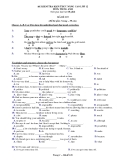
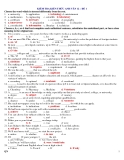
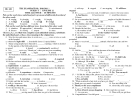
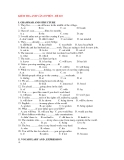
![Đề kiểm tra Tiếng Anh 1 tiết trắc nghiệm [năm] mới nhất](https://cdn.tailieu.vn/images/document/thumbnail/2011/20111008/chelsea2518/135x160/kiem_tra_anh_van_45_ph25_5667.jpg)

![Đề thi Tiếng Anh có đáp án [kèm lời giải chi tiết]](https://cdn.tailieu.vn/images/document/thumbnail/2025/20250810/duykpmg/135x160/64731754886819.jpg)
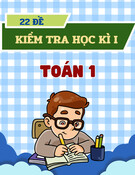
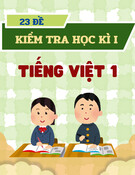

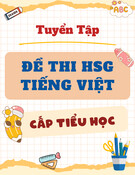
![Đề thi học kì 2 Vật lý lớp 11: Đề minh họa [Mới nhất]](https://cdn.tailieu.vn/images/document/thumbnail/2025/20250709/linhnhil/135x160/711752026408.jpg)
